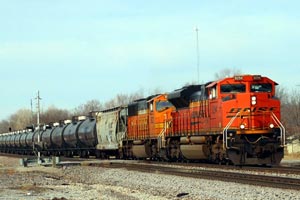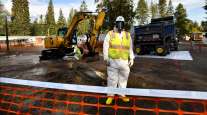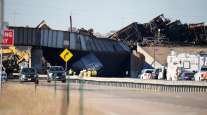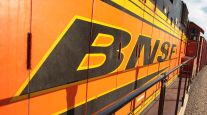Refiners Sue BNSF Railway Over $1,000 Oil Tank Car Surcharge

BNSF Railway Co. was sued by a trade group for 400 U.S. refining and petrochemical makers objecting to a $1,000 surcharge the nation’s biggest rail transporter of crude oil tacked onto older-model tank cars.
The American Fuel & Petrochemical Manufacturers complain the surcharge is designed to encourage shippers to retrofit or scrap older tank cars in favor of safer “jacketed” models that aren’t required by federal transportation-safety regulators.
The refining industry’s suit against its largest railway hauler is the latest in a barrage of lawsuits related to crude oil shipments, including those over the fiery 2013 crash in Quebec that killed 47 people. Crude-oil handling facilities serving rail lines are mired in lawsuits by community and environmental groups accusing regulators of failing to look at pollution and safety threats.
BNSF hauls more than 600,000 barrels of crude daily, including more than half of the oil pumped from the Bakken formation in North Dakota and Montana, according to a complaint in Houston federal court. The 23,000 older-model tank cars affected by the railroad’s surcharge comprise about 28% of the national crude oil rail fleet, the refiners said.
The surcharge adds $1.50 a barrel to shipping costs when crude prices have dropped by about 50% since mid-2014, according to the trade group, which represents about 95% of U.S. refining capacity. BNSF began adding the fee on Jan. 1.
Mike Trevino, a BNSF spokesman, declined to comment on the lawsuit filed March 13. Fort Worth, Texas-based BNSF is owned by Warren Buffett’s Berkshire Hathaway Inc.
This month a BNSF train carrying Bakken crude derailed in rural Illinois, catching fire and spurring first responders to evacuate homes in a 1-mile radius. Of the 105 cars, of which two were hauling sand, 21 left the tracks and at least five caught fire. The BNSF accident occurred only a few days before a Canadian National Railway Co. crude train jumped the tracks near Gogama, 373 miles north of Toronto. The derailment damaged a bridge over a waterway and five tank cars caught fire.
No one was injured in either accident, which didn’t involve any of the older cars subject to the surcharge.
Crude-train derailments have spurred U.S. and Canadian authorities to begin drawing up regulations to improve safety, especially after the fatal July 2013 inferno in Lac Megantic, Quebec. The new rules are expected at minimum to mandate modifications for tank cars built before October 2011.
The Pipeline and Hazardous Materials Safety Administration is drafting new safety standards for rail shippers that would require older tank cars to eventually be retrofitted or phased out, according to the refining and petrochemical industry group’s lawsuit.
“BNSF’s assertion of unilateral regulatory authority over crude oil tank car standards conflicts with the pending PHMSA rulemaking on such standards,” the trade group said in its complaint. Regulators’ authority over tank car safety standards would be “undermined” if railroads were allowed “to use financial surcharges and penalties to coerce companies to adopt different standards.”
The case is American Fuel & Petrochemical Manufacturers v. BNSF Railway Co., 15-00682; U.S. District Court, Southern District of Texas (Houston).




